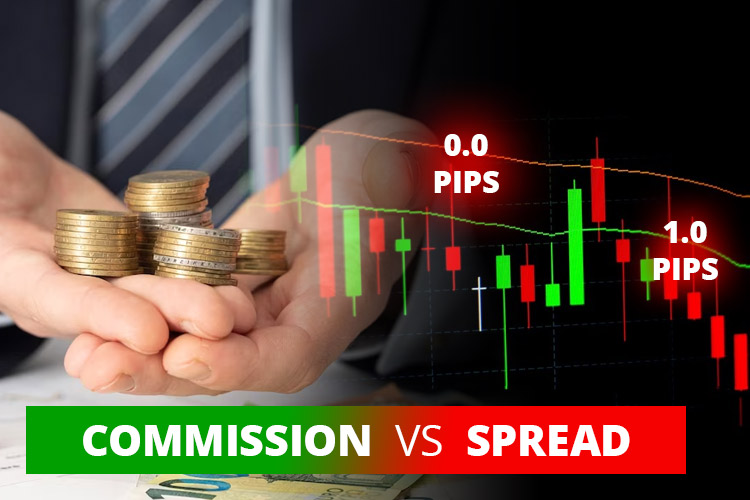Which is better, commission or spread??
Choosing a broker is sometimes associated with commissions or spreads。It's not as simple as which is cheaper, but which is more reasonable for you。

Today there are thousands of Forex brokers in the market, each with different rules, benefits and risks。Regarding trading fees, most brokers will let you choose between spreads and commissions。
If you only choose to pay the spread, you don't need to pay any commission, but the spread is usually higher。On the other hand, if you choose a commission, you must pay a fixed commission for each transaction, but the spread is much lower。
Some traders may ask, which is better, spread or commission。Well, simply put, spreads are for traders who don't limit the size of their positions, while commissions are more suitable for scalpers who prefer small transactions。
Why spreads are more suitable for ordinary traders
The spread is the difference between the bid price and the ask price of a particular asset.。The bid price is the price at which you sell the currency, and the ask price is the price at which you buy the currency。
Spreads are good for the average trader because there is only one fee per trade。This means that traders do not have to pay a fee for each lot of transactions, allowing them to choose the number of lots they want。
However, the actual amount of the spread may vary depending on the assets traded。Spreads for major currency pairs with large trading volumes are usually smaller, while spreads for special currency pairs are much larger。Also, be aware that spreads may suddenly increase during important news releases and large market fluctuations。
Today, traders can easily calculate the spread using a spread calculator。However, for a better understanding, the following is how the spread works:
Suppose a trader holds a GBP / USD position。At the time of the transaction, the purchase price was 1.1000, the selling price is 1.1005。Then, the spread cost is:
Spread = Selling Price - Buying Price = 1.1005-1.1000 = 0.0005 points
Why commissions are better for scalpers
Forex brokers usually charge low spreads while charging commissions.。Please note that the spread charged in this case is usually very low and can be called the original spread, the tightening spread or even the zero spread。If the regular spread is about 1 point, then the original spread including the commission may be about 0.1 point。As a result, some may view commissions as a form of compensation for falling spreads。
The problem is that forex broker commissions are calculated on a volume basis。$3 per 1 standard hand, $2 per 1 mini hand。This undoubtedly limits most traders' attempts to trade lots.。
For a better understanding, here's how commissions are collected:
Suppose the broker charges a commission of $7 per lot.。But if the investor trades 0.1 lot (10,000 units) and 0 commission.7美元。
So commissions are likely to benefit scalpers with smaller trading volumes。In addition, the low spreads that accompany commissions are a good match for scalpers because accumulating high spreads can harm their risk management。
Nevertheless, the trader pays the spread in addition to the commission, although the spread is lower than the standard account。
SUMMARY
For a better understanding of spreads and commissions, check out the table below to compare。
| Transaction costs | ✔ ️ Advantages | Disadvantages |
| Price difference only | Easily predict the cost of each transaction No additional transaction costs Charge by position only |
generally higher because there is no guarantee that the spread is the original spread or zero spread。 Can be used as a fixed spread, indicating the trading desk environment。 |
| Commission (+ spread) | Low spread or no spread Usually with ECN specifications and market execution |
adds an additional cost per trade that may be detrimental to the trader。 may not be so cost-effective for traders with large trading volumes。 May complicate risk management as traders need to calculate commissions outside of spreads。 |
The comparison above clearly illustrates how spreads can cover more types of traders, from beginners to experts who tend to explore trade size。This is because pure spreads ensure no additional fees and are only charged when opening a trade。In addition, the spread amount is not multiplied by the number of trading lots。
On the other hand, commissions may be more suitable for scalpers who demand extremely low spreads。They also tend to open positions with smaller volumes because their aim is to accumulate profits from small but frequent trading positions.。
Disclaimer: The views in this article are from the original Creator and do not represent the views or position of Hawk Insight. The content of the article is for reference, communication and learning only, and does not constitute investment advice. If it involves copyright issues, please contact us for deletion.